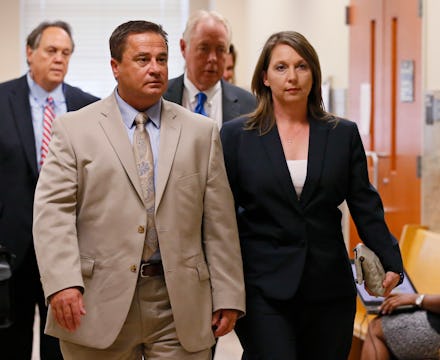Betty Shelby Trial: 3 takeaways from testimony in the case of Terence Crutcher's killer

Testimony in the racially charged manslaughter trial of Betty Shelby, the Tulsa, Oklahoma, police officer who fatally shot Terence Crutcher — a stranded black motorist who was unarmed — in September, wrapped up on Tuesday, the Tulsa World newspaper reported. Shelby, a white officer who has denied opening fire on Crutcher because of his race, is accused of using an unreasonable amount of force to subdue him.
Court will resume on Wednesday with closing statements from the prosecution and the defense, according to KOTV. Then it'll be up a 12-juror panel, which includes two African-Americans, to decide Shelby's fate.
The officer faces up to life in prison, if convicted of a first-degree manslaughter charge. Shelby pleaded not guilty.
The Sept. 16 shooting garnered national attention after police video footage showed Crutcher with his hands up and walking away from officers before he was stunned with a stun gun and shot in the chest. Shelby's case is among a few police-involved shootings caught on video, in the last couple of years, for which officers will face trials in May.
Here are the top three takeaways from testimony in Shelby's trial.
Prosecutors made "skin color" an "issue" in the trial
In opening statements last Wednesday, District Attorney Steve Kunzweiler said race was undeniably "an issue in the case," Tulsa World reported. Kevin Gray, the assistant DA, described Shelby to jurors as an overemotional police officer and suggested that she feared Crutcher because he was a black man.
Shelby's defense attorney, Shannon McMurray, countered that a rush to judgement by the Tulsa police chief and the DA's office was the only reason why her client faced charges in Crutcher's death. "Somebody did act unreasonably and in the heat of passion and out of fear, but it was not Betty Shelby. It was Steve Kunzweiler," McMurray said in opening statements, according to Tulsa World.
Judge Doug Drummond would not allow Shelby's defense team to bring up the fact that an autopsy revealed Crutcher had the drug PCP in his system. But because prosecutors called Shelby's character witnesses, Drummond allowed other Tulsa officers to testify Crutcher's history of drug addiction and run-ins with police. Initially, the judge would not allow it because none of that information was relevant or known to Shelby at the time of the shooting.
Multiple witnesses testified that Crutcher posed no threat to Shelby
Shelby has said she shot the unarmed Crutcher because she believed he was reaching into his stalled SUV for a gun. But even Michael Richert, the Tulsa officer who was in a helicopter above the scene, and who is heard on radio saying Crutcher "looks like a bad dude," testified that Crutcher hadn't done anything to solicit his remark.
"I was basing those statements on everything in the totality of the circumstances," Richert said in court, according to the AP.
At least six of the prosecution's witnesses testified that Crutcher hadn't done or said anything to officers to indicate he meant them harm, the Associated Press reported. The witnesses' testimony contradicted Shelby's account that Crutcher was disobeying her commands and kept reaching in his pockets.
The defense's suggestion that a screwdriver later found in Crutcher's vehicle could be considered a weapon drew audible groans from throughout the courtroom, Tulsa World reported. The line of questioning prompted a rebuke from Mareo Johnson, a Tulsa pastor and supporter of the Black Lives Matter movement who criticized McMurray for "grasping."
Officer Shelby blamed Crutcher for his own death
Shelby took the the stand in her own defense on Monday, reiterating much of her previous statements about the shooting. Shelby told jurors that she repeatedly shouted commands for Crutcher to lay on the ground and keep away from his stalled vehicle, CNN reported.
But as Crutcher got within inches of the SUV, Shelby said she was left with no other choice. She believed he was reaching into the vehicle for a gun and feared for her life. "We're not trained [as officers] to see what comes out of a car," Shelby said Monday in court. "We're trained to stop a threat and by all indications, he was a threat."
As the prosecution and defense rested their cases on Tuesday, Shelby's defense team asked for a mistrial due to perceived mischaracterizations by prosecutors about their client's "story." Drummond denied the motion, Tulsa World reported.